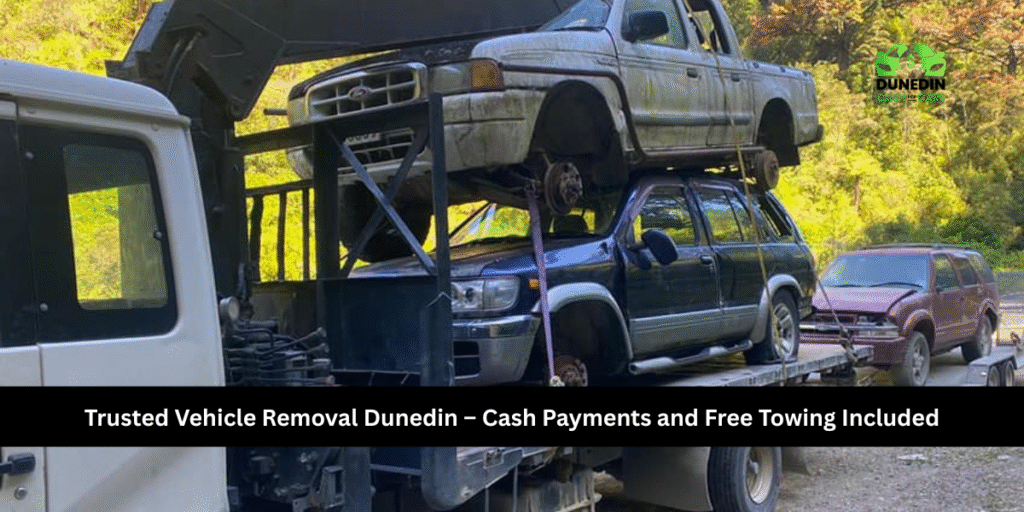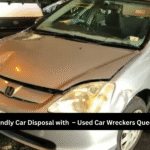Vehicle disposal trust issues stem from three concerns: uncertain pricing, hidden fees, and unreliable service delivery. Vehicle Removal Dunedin through Dunedin Cash for Cars eliminates these concerns with transparent phone quotes, zero additional charges, and confirmed collection schedules. The service operates across Dunedin and Mosgiel, handling all vehicle types with immediate cash payment at pickup and complimentary towing regardless of distance or condition. Trust builds through consistent service delivery—quoted prices match paid amounts, scheduled collections happen on time, and documentation gets completed professionally every transaction.
What Makes Vehicle Removal Services Trustworthy?
Trustworthy services demonstrate three characteristics: pricing transparency, service consistency, and proper business registration. They quote accurately over the phone without surprise deductions at collection. They arrive on scheduled dates with appropriate equipment. They maintain legitimate business operations with verifiable physical locations and proper licensing.
Vehicle Removal Dunedin operators build trust through track records. Established businesses serve communities long-term rather than operating opportunistically. Their reputation depends on consistent fair dealing since unhappy customers damage business viability in local markets.
Registration with proper authorities signals legitimacy. Licensed operators hold waste management permits and maintain insurance coverage protecting both themselves and customers during transactions.
How Does Free Towing Work Without Catches?
Free towing represents a genuine service inclusion without hidden conditions. The removal company absorbs transport costs as standard operational expenses. Their business model profits from vehicle parts and materials sales, making towing costs recoverable through downstream revenue.
No fine print conditions reduce quoted prices. The amount discussed during phone assessment represents final payment barring significant vehicle misrepresentation. Distance within standard service areas doesn’t trigger additional charges.
This model works economically because vehicle value exceeds towing expenses. A car worth $700 in parts and scrap might cost $100-150 to tow. The company absorbs this cost knowing the margin remains profitable after accounting for transport.
What Payment Methods Ensure Transaction Security?
Cash payments for amounts under $1,000 complete immediately at collection. The crew arrives with payment ready for exchange upon paperwork completion. This traditional method provides instant finality—you hold funds the moment the vehicle loads.
Bank transfers handle larger transactions through mobile banking platforms. The transfer processes during collection with both parties confirming completion before the vehicle departs. Modern banking enables instant transfers that settle within seconds, providing immediate payment verification.
Both methods eliminate payment uncertainty. No waiting for cheques to clear or processing delays that create anxiety about whether payment will actually arrive. The transaction completes face-to-face with immediate confirmation.
Which Vehicle Conditions Get Accepted Universally?
All conditions qualify without exceptions. Running vehicles with current registration get accepted alongside non-starters with expired paperwork. Accident-damaged cars qualify identically to mechanically sound vehicles needing minor repairs.
Universally accepted conditions include:
- Complete running vehicles
- Non-starting mechanical failures
- Accident-damaged bodies
- Fire or flood-affected cars
- Rust-compromised structures
- Failed WOF vehicles
- Deregistered cars
- Partially dismantled projects
- Vehicles missing major components
Condition affects payment amount but never disqualifies vehicles from acceptance. Even stripped shells with missing engines contain scrap metal value justifying collection and payment.
How Do Transparent Quotes Prevent Disputes?
Transparent quoting requires accurate vehicle descriptions. Provide make, model, year, condition details, and location information during initial contact. The service quotes based on these specifics, creating reasonable expectations for both parties.
Honest condition descriptions prevent collection-time surprises. If you describe mechanical issues accurately and note body damage areas, the quoted price reflects this reality. Misrepresentation—claiming a running engine when it’s seized—justifies price adjustments since the actual condition differs from descriptions.
Most disputes arise from miscommunication rather than deceptive practices. Clear communication during quoting eliminates most potential disagreements. Reputable services ask clarifying questions ensuring they understand vehicle condition before quoting.
What Documentation Protects Your Legal Interests?
Disposal certificates prove proper vehicle transfer. These NZTA-processed documents confirm you’re no longer the registered owner, protecting you from future parking fines, traffic violations, or legal issues involving the vehicle.
The removal service completes ownership transfer paperwork during collection. They process Notice of Disposal forms through official channels and provide confirmation documentation within days. This administrative handling ensures regulatory compliance without requiring your navigation of bureaucratic processes.
License plate removal and return prevents misuse. The service removes plates during collection and hands them to you for proper surrender to licensing authorities. This step disconnects the plates from the vehicle permanently.
How Does Scheduling Reliability Work?
Confirmed collection appointments specify date and arrival window. Most services schedule within 24-48 hours of agreement with morning or afternoon time slots. This specificity enables planning around work schedules and other commitments.
Communication happens proactively if delays occur. Weather, mechanical issues, or scheduling conflicts sometimes require rescheduling. Trustworthy operators notify customers immediately when problems arise rather than simply not appearing.
Punctuality reflects professionalism. Services arriving within scheduled windows demonstrate respect for customer time. Chronic lateness or missed appointments without communication signals unreliable operations worth avoiding.
What Happens During the Actual Collection?
The removal crew arrives with appropriate towing equipment—standard tow trucks for accessible vehicles or specialized equipment for difficult situations. They inspect the vehicle briefly confirming it matches your description.
Paperwork completion happens next. You sign ownership transfer documents and provide required identification. The crew processes payment immediately through your preferred method. This administrative step takes 10-15 minutes typically.
Vehicle loading completes the process. The crew secures the car for transport using proper equipment preventing damage to your property during removal. The entire collection from arrival to departure spans 20-40 minutes depending on vehicle accessibility.
Why Does Business Reputation Matter?
Established businesses depend on ongoing customer relationships and community reputation. Poor service generates negative reviews damaging future business prospects. This accountability incentivizes fair dealing and professional service delivery.
Local operations face greater accountability than transient operators. Businesses serving Dunedin long-term can’t simply disappear after problematic transactions. Their physical presence and established customer base create natural consequences for poor service.
Review platforms and word-of-mouth referrals amplify reputation effects. One negative experience shared online reaches hundreds of potential customers. Reputable operators understand this dynamic and prioritize customer satisfaction accordingly.
How Do Multiple Vehicle Transactions Work?
Estates, businesses, or property owners disposing of multiple vehicles receive coordinated assessment and collection. One contact handles all vehicles with individual pricing but unified scheduling for efficiency.
Bulk transactions sometimes negotiate improved per-vehicle rates. Removing several cars simultaneously reduces per-vehicle operational costs, allowing services to offer better pricing. Three or more vehicles frequently qualify for volume considerations.
Administrative simplification benefits customers handling multiple disposals. One invoice covers all vehicles. One documentation set processes all transfers. One contact person manages the entire transaction rather than requiring separate coordination for each vehicle.
What Makes Free Towing Economically Viable?
Vehicle material value exceeds transport costs in virtually all cases. Even low-value cars contain $300-500 in scrap metal at current commodity rates. Towing within Dunedin rarely exceeds $150, leaving margin for profitable transactions.
Parts recovery adds substantial value beyond scrap metal. Functional engines, transmissions, and body panels from higher-value vehicles generate revenue multiples above basic material worth. This parts income subsidizes towing costs across all vehicle acquisitions.
Volume operations distribute costs efficiently. Services collecting multiple vehicles daily amortize equipment and staffing costs across many transactions. Individual towing costs decrease as volume increases, making free towing sustainable economically.
How Does Payment Timing Build Trust?
Immediate payment eliminates uncertainty about transaction completion. You receive funds before the vehicle leaves your property, preventing situations where vehicles get collected but payment never arrives.
This timing protects both parties. You verify payment before releasing the vehicle. The service confirms ownership transfer before departing with your car. The simultaneous exchange creates natural transaction security.
Delayed payment models introduce risk and anxiety. Services requiring weeks for payment processing create unnecessary uncertainty. Immediate payment demonstrates financial stability and professional operations.
What Protections Exist Against Fraudulent Operations?
Business registration verification provides basic protection. Legitimate operators maintain physical business locations with verifiable addresses and contact information. They hold proper business licenses and waste management permits.
Request documentation before committing. Ask about their disposal procedures and what certifications they maintain. Legitimate operators provide this information readily while fraudulent operations avoid specifics.
Review feedback from previous customers offers practical protection. Online reviews, social media comments, and community recommendations reveal service patterns. Consistently negative feedback signals operations worth avoiding.
Why Does Service Area Coverage Matter?
Comprehensive service area coverage ensures accessibility regardless of property location. Services covering all of Dunedin and Mosgiel eliminate geographic restrictions that might otherwise complicate disposal.
Distance within service areas doesn’t affect pricing or service quality. Suburban Mosgiel addresses receive identical treatment to central Dunedin locations. This consistency simplifies decision-making since location doesn’t introduce variables.
Clear service boundaries prevent misunderstandings. Knowing whether your property falls within free towing areas or requires additional fees eliminates surprise charges during collection.
How Do Emergency Removals Get Handled?
Urgent situations—council notices, property sales, or insurance deadlines—sometimes require accelerated service. Established operators accommodate rush requests when scheduling permits, often achieving same-day collection for morning requests.
Emergency service typically doesn’t cost extra with reputable operators. It’s about routing flexibility rather than premium charges. If trucks operate near your area and time slots exist, urgent collection happens at standard rates.
Communication clarity helps emergency requests succeed. Explain the urgency and required timeline during initial contact. This information lets the service prioritize your removal appropriately within their scheduling constraints.
What Role Does Customer Service Quality Play?
Professional customer service answers questions clearly and processes requests efficiently. You shouldn’t face confusion about pricing, procedures, or timelines. Quality service provides straightforward information enabling informed decisions.
Responsive communication builds confidence. Services returning calls promptly and answering inquiries thoroughly demonstrate operational competence. Poor communication often signals broader service quality issues.
Respectful treatment matters throughout transactions. From initial phone contact through final collection, professional operators treat customers and property with appropriate respect. This baseline professionalism separates quality services from marginal operations.
Conclusion
Trust in vehicle removal services develops through transparent pricing, consistent service delivery, and professional operational standards. Established operators demonstrate reliability through track records, proper licensing, and community accountability. The combination of immediate payment, free towing, and comprehensive documentation handling creates transactions that benefit customers while maintaining profitable business operations.



